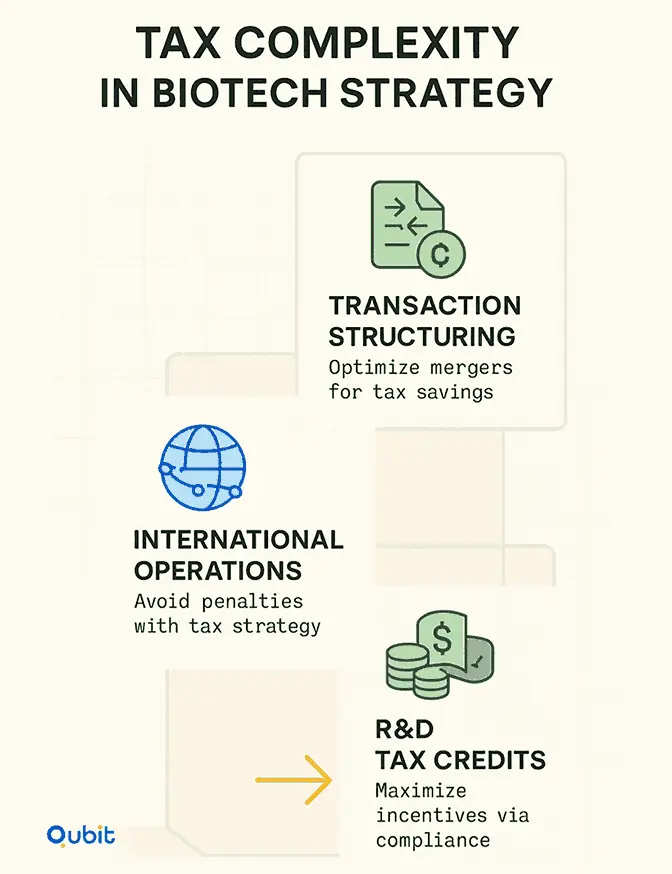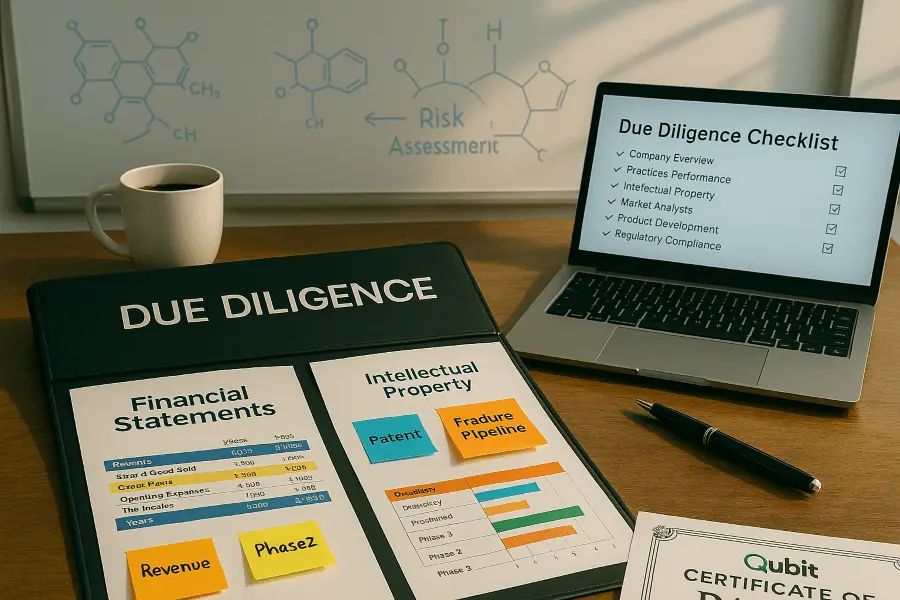Biotech startups are capturing global attention, with funding reaching an impressive $65 billion. This surge highlights the growing investor appetite for innovative solutions in healthcare, agriculture, and environmental science. However, securing investment requires more than groundbreaking ideas, it demands a meticulous approach to due diligence. Investors are keen to assess not only the science behind the product but also the operational, financial, and regulatory frameworks supporting it.
Your investigation into investor due diligence finds a broader context in the biotech startup fundraising strategies article, which outlines comprehensive funding frameworks that underpin successful biotech ventures.
Founders who understand these dynamics can better position their startups to align with investor expectations and capitalize on market momentum.
Let's get started!
Understanding Biotech Due Diligence
The complexities of biotech due diligence requires a focus on critical areas like cybersecurity and tax provisions. These elements not only influence operational integrity but also play a pivotal role in shaping investor confidence and regulatory compliance.
Cybersecurity: Protecting Sensitive Data
Biotech companies often handle sensitive data, including proprietary research, patient information, and intellectual property. Ensuring robust cybersecurity measures is essential to safeguard these assets from breaches and unauthorized access.
- Risk Assessment: Conducting regular audits helps identify vulnerabilities within systems and processes. This proactive approach minimizes exposure to cyber threats.
- Compliance Standards: Adhering to industry-specific regulations, such as GDPR or HIPAA, ensures that data handling practices meet legal requirements.
- Employee Training: Educating staff on cybersecurity protocols reduces the risk of human error, which is often a leading cause of data breaches.
Tax Provisions: Navigating Financial Complexity
Tax considerations are another critical aspect of biotech due diligence. From R&D tax credits to international tax compliance, understanding these provisions can significantly impact a company’s financial health.

- R&D Tax Credits: Many biotech firms qualify for tax incentives related to research and development activities. Proper documentation and compliance are key to maximizing these benefits.
- International Operations: For companies with global reach, navigating cross-border tax regulations is essential to avoid penalties and optimize financial strategies.
- Transaction Structuring: Strategic planning during mergers or acquisitions can mitigate tax liabilities and enhance overall deal value.
A thorough exploration of investor expectations is complemented by the biotech investor Q&A article, which provides concrete examples of addressing challenging questions during funding discussions.
Caveats and Considerations in Biotech
Biotech investments come with unique challenges that demand careful evaluation. While this guide serves as a valuable risk assessment tool, it is essential to recognize its limitations. It is not an exhaustive checklist but rather a framework to help investors identify critical factors that influence decision-making in this complex sector.
Understanding the Scope of the Guide
Unlike traditional investment sectors, biotech ventures often hinge on regulatory approvals, clinical trial outcomes, and intellectual property rights. These variables introduce a level of uncertainty that cannot be fully addressed by any single checklist. Investors must remain adaptable, supplementing this guide with specialized insights and expert consultations to account for the nuances of each opportunity.
Audience-Specific Caveats
Not all investors approach biotech ventures with the same objectives or expertise. For institutional investors, the focus may lean heavily on scalability and long-term market potential. On the other hand, individual investors might prioritize short-term gains or niche innovations. This guide aims to provide a balanced perspective but may not fully align with every investor’s specific goals.
Moreover, biotech startups often operate in uncharted territories, where the risks of failure are higher than in more established industries. Investors should be prepared for scenarios where even well-researched ventures face setbacks due to unforeseen scientific or regulatory hurdles.
The Importance of Trust and Due Diligence
Building trust with biotech startups is as crucial as assessing their technical and financial viability. A detailed understanding of interpersonal investor relations is mirrored in the build investor trust biotech article, where nuanced methods of fostering reliability are discussed in relation to due diligence. This aspect underscores the importance of evaluating not just the business model but also the leadership and communication strategies of the biotech team.
Components of a Biotech Firm Diligence
Evaluating biotech ventures requires a meticulous approach, as investors must assess multiple dimensions to determine the viability and potential of a company. This section outlines the critical components that form the foundation of biotech diligence, offering a comprehensive framework for informed decision-making.
Understanding Unmet Needs
Identifying unmet medical needs is often the first step in biotech diligence. Investors analyze whether the company’s product or technology addresses a significant gap in healthcare. This involves assessing the prevalence and severity of the condition targeted, the limitations of existing treatments, and the potential impact of the proposed solution. A compelling unmet need not only validates the scientific endeavor but also strengthens the commercial case for investment.
Management Expertise
The leadership team plays a pivotal role in the success of any biotech venture. Investors scrutinize the management’s track record, industry experience, and ability to navigate complex regulatory landscapes. A team with proven expertise in drug development, commercialization, and strategic partnerships can significantly enhance the likelihood of achieving milestones.
Scientific Methodology
The robustness of the scientific approach is another cornerstone of diligence. Investors examine the underlying technology, research data, and preclinical studies to ensure the science is credible and innovative. Peer-reviewed publications, collaborations with academic institutions, and intellectual property protection further bolster confidence in the scientific foundation.
Clinical Data Assessment
Clinical trials are a critical phase in biotech development, and their outcomes often dictate the trajectory of a company. Investors evaluate trial design, endpoints, patient population, and statistical significance of results. Positive clinical data not only validates the efficacy and safety of the product but also serves as a catalyst for regulatory approval and market entry.
Competitor Positioning
Investors analyze direct competitors, alternative therapies, and emerging technologies to assess the company’s differentiation. A strong competitive position, supported by unique mechanisms of action or superior efficacy, can significantly enhance market share and investor confidence.
Manufacturing Scalability
Biotech products often require complex manufacturing processes, and scalability is a key consideration during diligence. Investors evaluate the company’s ability to produce its product at scale while maintaining quality and cost efficiency. Partnerships with contract manufacturing organizations (CMOs) or in-house capabilities can influence scalability and timelines.
Commercial Implications
The commercial potential of a biotech product is a critical determinant of its investment appeal. Investors assess market size, pricing strategies, reimbursement pathways, and distribution channels. A well-defined commercialization plan, supported by market research and strategic partnerships, can significantly enhance the product’s success.
Financial Valuation
Finally, financial valuation ties together all aspects of diligence. Investors analyze revenue projections, funding requirements, and exit strategies to determine the company’s financial health and potential return on investment. Transparent financial reporting and realistic projections are essential for building trust and securing funding.
Conclusion
A strong due diligence process is essential for biotech founders aiming to secure investor confidence. This blog has highlighted key diligence components, including financial transparency, intellectual property validation, and regulatory compliance, all of which align with investor priorities. By presenting a clear, data-driven narrative, biotech ventures can demonstrate their readiness for growth and innovation.
At Qubit Capital, we understand the complexities of fundraising in the biotech sector. Our Fundraising Assistance service is designed to help biotech ventures secure the capital they deserve. Connect with us today to elevate your investor pitch and position your startup for success.
Key Takeaways
- Biotech due diligence requires a comprehensive evaluation of scientific, financial, and operational metrics.
- Investors prioritize clear data presentation and robust clinical trial evidence.
- Tailored risk assessments, including cybersecurity and tax provisions, enhance investment credibility.
- A strong management team and clear market need are critical for success.
- Professional services, like those offered by Qubit Capital, can streamline investor engagement and funding processes.
Frequently asked Questions
What is due diligence in biotech startups?
Due diligence in biotech startups involves a comprehensive assessment of several critical factors. This includes verifying the scientific validity of the technology, analyzing market potential, evaluating the leadership team’s expertise, and ensuring operational readiness. The goal is to minimize investment risks while identifying opportunities for growth.


 Back
Back



